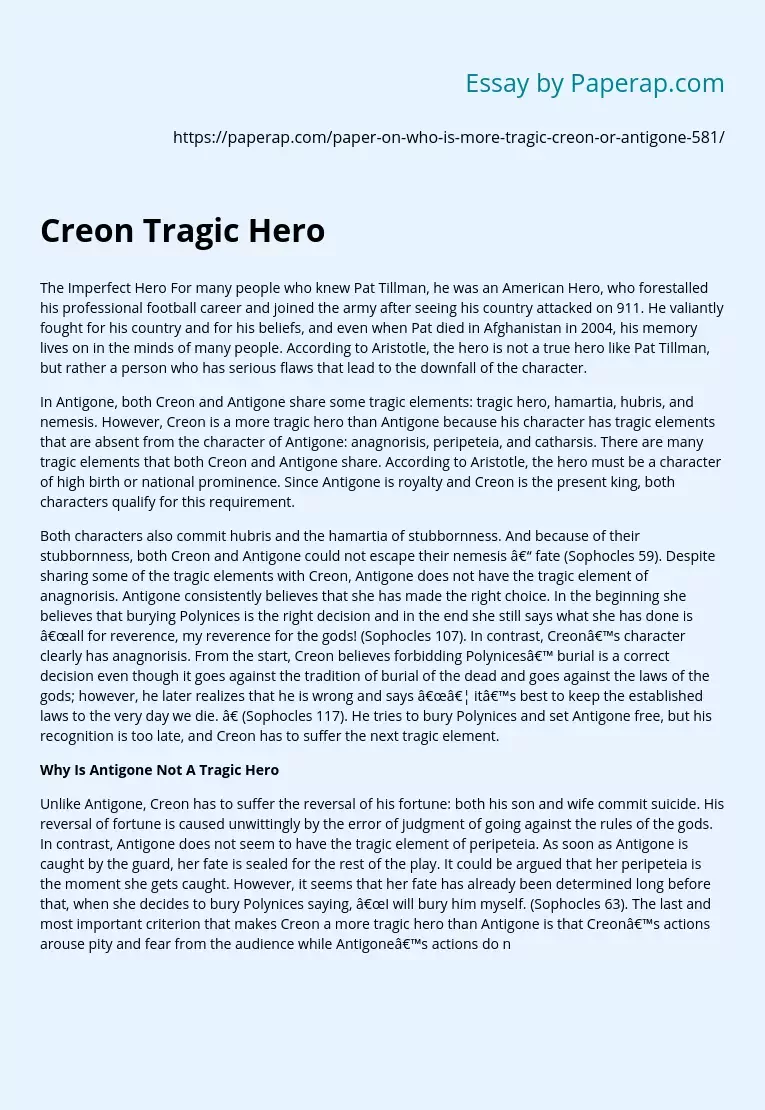Creon Tragic Hero
The Imperfect Hero For many people who knew Pat Tillman, he was an American Hero, who forestalled his professional football career and joined the army after seeing his country attacked on 911. He valiantly fought for his country and for his beliefs, and even when Pat died in Afghanistan in 2004, his memory lives on in the minds of many people. According to Aristotle, the hero is not a true hero like Pat Tillman, but rather a person who has serious flaws that lead to the downfall of the character.
In Antigone, both Creon and Antigone share some tragic elements: tragic hero, hamartia, hubris, and nemesis. However, Creon is a more tragic hero than Antigone because his character has tragic elements that are absent from the character of Antigone: anagnorisis, peripeteia, and catharsis. There are many tragic elements that both Creon and Antigone share. According to Aristotle, the hero must be a character of high birth or national prominence. Since Antigone is royalty and Creon is the present king, both characters qualify for this requirement.
Both characters also commit hubris and the hamartia of stubbornness. And because of their stubbornness, both Creon and Antigone could not escape their nemesis – fate (Sophocles 59). Despite sharing some of the tragic elements with Creon, Antigone does not have the tragic element of anagnorisis. Antigone consistently believes that she has made the right choice. In the beginning she believes that burying Polynices is the right decision and in the end she still says what she has done is “all for reverence, my reverence for the gods! (Sophocles 107).
In contrast, Creon’s character clearly has anagnorisis. From the start, Creon believes forbidding Polynices’ burial is a correct decision even though it goes against the tradition of burial of the dead and goes against the laws of the gods; however, he later realizes that he is wrong and says “… it’s best to keep the established laws to the very day we die. ” (Sophocles 117). He tries to bury Polynices and set Antigone free, but his recognition is too late, and Creon has to suffer the next tragic element.
Why Is Antigone Not A Tragic Hero
Unlike Antigone, Creon has to suffer the reversal of his fortune: both his son and wife commit suicide. His reversal of fortune is caused unwittingly by the error of judgment of going against the rules of the gods. In contrast, Antigone does not seem to have the tragic element of peripeteia. As soon as Antigone is caught by the guard, her fate is sealed for the rest of the play. It could be argued that her peripeteia is the moment she gets caught. However, it seems that her fate has already been determined long before that, when she decides to bury Polynices saying, “I will bury him myself. (Sophocles 63). The last and most important criterion that makes Creon a more tragic hero than Antigone is that Creon’s actions arouse pity and fear from the audience while Antigone’s actions do not. From the beginning the audience recognizes that Creon has committed the most egregious mistake possible by forbidding the citizens of Thebes from burying the dead body of Polynices, an act that defies the laws of the gods and of humanity (Sophocles 60). However, because of his hubris Creon could not see his error.
For this reason, the audience has pity for Creon, for no one can defy the gods and be able to avoid the consequence. The audience also has a fear for Creon because of his unpredictability. If he is not afraid of the gods, then what else he is capable of or willing to do to “protect his royal rights. ” (Sophocles 98). So when Creon finally realizes his error and accepts his fate, the audience gets relieved and elated. In contrast, Antigone’s actions do not arouse pity and fear from the audience. Because the purpose of her actions is to obey the gods, she acts like a saint.
For this reason, the audience has sympathy for her suffering and not pity. And there is no reason to have fear for a saintly person. Despite the play being named after Antigone, Creon is the tragic hero of the story because he has a more complete set of tragic elements in his character. Generally, it is more tempting for reader to choose Antigone as the tragic hero because she is the protagonist and a good person who is obedient to the gods, unlike Creon who is defiant to the laws of the gods making him a bad person in the story.
However, an antagonist can be the tragic hero just as a bad person can be the main character in a movie, so as long as the bad person has the main role and is involved in more parts of the story. In this context, Creon does fit the role of a tragic hero, since he seems to be at the center of all conflicts: Creon vs. the gods, Creon vs. Antigone, Creon vs. Haemon, Creon vs. Tiresias, Creon vs. Eurydice, and Creon vs. the sentry. Finally, with many readers repudiating his actions, Creon seems to have a conflict with the audience as well.
Creon Tragic Hero. (2019, Dec 05). Retrieved from https://paperap.com/paper-on-who-is-more-tragic-creon-or-antigone-581/

